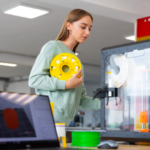Emotional health plays a vital role in our overall well-being, yet it is often overlooked in comparison to physical health. However, recent advancements in technology have introduced innovative ways to monitor emotional health, with one of the most exciting developments being the Emometre. This device is revolutionizing the way we track, understand, and manage emotions, offering valuable insights into how our emotional state impacts our daily lives.
In this blog post, we will explore how the Emometre works, its benefits, and why it is the future of emotional health monitoring.
What is the Emometre?
The Emometre is a cutting-edge device designed to track emotional states through biometric feedback, such as heart rate, skin conductance, and facial expressions. Unlike traditional methods of emotional monitoring, which may rely on subjective reporting, this technology uses objective data to provide real-time insights into a person’s emotional well-being.
Key Features of the Emometre:
Biometric Tracking: This technology captures data from various physiological indicators, including heart rate variability and skin conductivity, to monitor emotional responses.
Real-Time Feedback: This device provides users with real-time data about their emotional states, helping them understand how specific events or situations affect their emotions.
Portable and Easy to Use: The Emometre is lightweight and designed for everyday use. It can be worn discreetly, ensuring users can track their emotions wherever they go.
How Does the Emometre Work?
This technology works by measuring various physiological changes that occur when a person experiences emotions. These changes include shifts in heart rate, skin conductance (sweat levels), and facial muscle movements. Here’s how it works in detail:
Heart Rate Variability: When we experience stress or excitement, our heart rate fluctuates. This Technology tracks these fluctuations and provides insights into how your emotional state influences your heart rate.
Skin Conductance: Emotions like anxiety or excitement lead to an increase in sweat production, which can be detected through changes in skin conductance. this technology uses this data to assess your emotional intensity.
Facial Expression Analysis: Using built-in facial recognition technology, the Emometre can detect micro-expressions and provide valuable data on how you’re feeling, even if you’re unaware of your emotional state.
Benefits of the Emometre
The Emometre offers several benefits that make it a game-changer in emotional health tracking. These benefits can help both individuals and healthcare professionals better understand emotional well-being.
Better Emotional Self-Awareness
By tracking real-time data on emotional changes, users can develop a deeper understanding of how their emotions fluctuate throughout the day. This leads to greater self-awareness and emotional regulation.
Enhanced Mental Health
Regular use of this technology can help users recognize early signs of stress, anxiety, or depression. By monitoring their emotional states, users can take proactive steps to address negative emotions before they escalate.
Improved Decision-Making
Understanding your emotional state can significantly improve decision-making. With the Emometre, you can assess how certain emotions are influencing your choices, leading to better decision-making in personal and professional contexts.
Informed Therapy and Treatment
For mental health professionals, the Emometre provides objective data that can complement traditional methods of therapy. This information can help tailor treatments and interventions to better address the emotional needs of clients.
Why is the Emometre the Future of Emotional Health Monitoring?
In today’s fast-paced world, stress, anxiety, and other emotional health issues are becoming more prevalent. Traditional methods of emotional health tracking, such as self-reporting or talking to a therapist, often fall short in capturing the full picture. The Emometre solves this problem by offering:
Objective Data: It moves beyond subjective feelings and reports, offering measurable, quantifiable data that paints a clearer picture of emotional well-being.
Continuous Monitoring: Unlike occasional check-ins with a mental health professional, the this technology offers continuous monitoring, allowing users to track emotions throughout the day.
Personalized Insights: By analyzing patterns in emotional data, the this technology provides users with personalized insights, making it easier to recognize triggers and take preventive measures.
The Science Behind the Emometre
The Emometre uses advanced technologies that have been backed by extensive research in the fields of psychology, neuroscience, and physiology. By measuring heart rate variability (HRV), skin conductance response (SCR), and facial expressions, the device offers a comprehensive approach to emotional tracking.
Technology Purpose Benefit
Heart Rate Variability (HRV) Monitors fluctuations in heart rate Helps understand emotional stress
Skin Conductance (SCR) Measures sweat levels to detect emotional arousal Identifies emotional intensity
Facial Expression Analysis Detects micro-expressions to analyze emotions Provides additional emotional data
How to Use the Emometre
Using the Emometre is simple. The device can be worn as a wristband, headband, or even clipped onto clothing. Here’s how to use it:
- Wear the Device: Place the device on your wrist or any preferred location on your body.
- Track Your Emotions: The device will automatically begin tracking your biometric data.
- Review Your Data: Through a connected mobile app, you can review the emotional data collected by the Emometre.
- Take Action: Based on the insights, you can take steps to manage your emotional health, whether through relaxation techniques, therapy, or lifestyle changes.
Conclusion
The Emometre is set to revolutionize emotional health monitoring by providing a more accurate, real-time, and objective way of tracking emotions. With its ability to measure heart rate, skin conductance, and facial expressions, it offers users valuable insights into their emotional states, helping them better manage their mental health.
As emotional well-being becomes an increasing focus in health and wellness, the this technology stands out as an essential tool for anyone looking to improve their emotional health and self-awareness.
By incorporating the this technology into your daily life, you can take proactive steps toward understanding and managing your emotions, leading to a healthier, more balanced life.
Frequently Asked Questions (FAQ)
How does the Emometre help with mental health?
The Emometre helps individuals monitor their emotional states, allowing them to take proactive steps in managing stress, anxiety, and other emotional health challenges.
Is the Emometre suitable for everyone?
Yes, the Emometre is suitable for people of all ages. However, it is especially beneficial for those looking to track and manage their emotional well-being regularly.
Can the Emometre replace therapy or professional help?
No, the Emometre is designed to complement therapy and self-care routines. It provides valuable insights but does not replace the need for professional mental health support.
How accurate is the Emometre?
The Emometre is highly accurate, thanks to its use of biometric data and facial recognition technology. It provides real-time insights into your emotional state based on measurable data.
Can the Emometre track different emotions?
Yes, the Emometre is capable of detecting a wide range of emotions, including stress, excitement, anxiety, and calmness, based on changes in heart rate, skin conductance, and facial expressions.
Is the Emometre easy to use?
Yes, the Emometre is user-friendly. It comes with a simple interface that allows users to track and understand their emotional data easily.
How often should I use the Emometre?
For optimal results, it is recommended to wear the Emometre regularly throughout the day to track emotional patterns. Continuous use provides the most accurate insights.
Can I share my data with healthcare providers?
Yes, the Emometre allows you to share your emotional data with healthcare providers, which can help them offer more tailored treatments or interventions.







